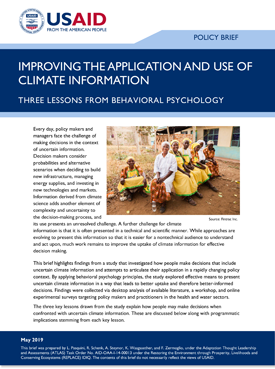Development programs worldwide are designed to protect vulnerable people, places, and livelihoods from climate change, but with smarter methods, these programs could be even more effective.

Improving the Application and Use of Climate Information: Three Lessons from Behavioral Psychology .
Technical Brief | May 30, 2019

An analysis of how stakeholders make decisions that include ambiguous climate-relevant information, with an attempt to articulate the application of such information in a rapidly changing policy context. By inserting behavioral psychology principles, this study examines effective means of applying that climate information for better decision making.
This brief highlights findings from a study that investigated how people make decisions that include uncertain climate information and attempts to articulate their application in a rapidly changing policy context. By applying behavioral psychology principles, the study explored effective means to present uncertain climate information in a way that leads to better uptake and therefore better-informed decisions. Findings were collected via desktop analysis of available literature, a workshop, and online experimental surveys targeting policy makers and practitioners in the health and water sectors.
